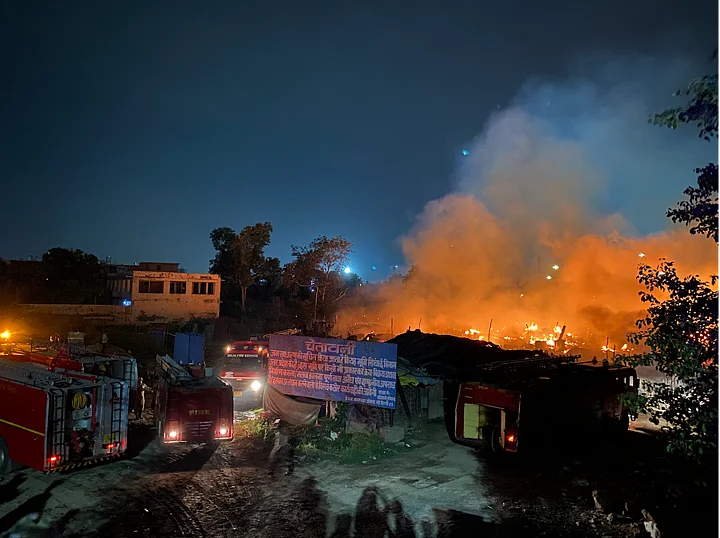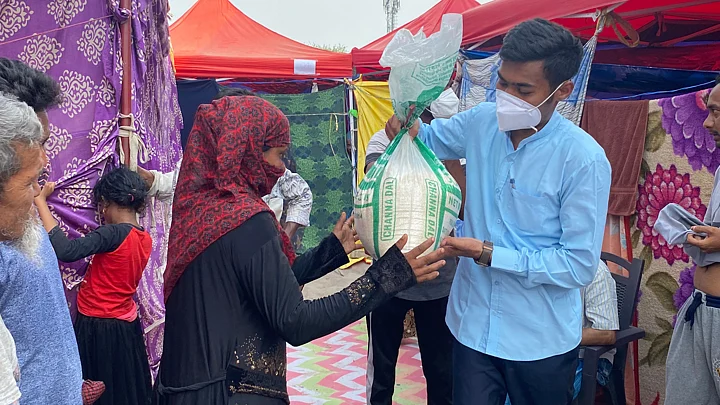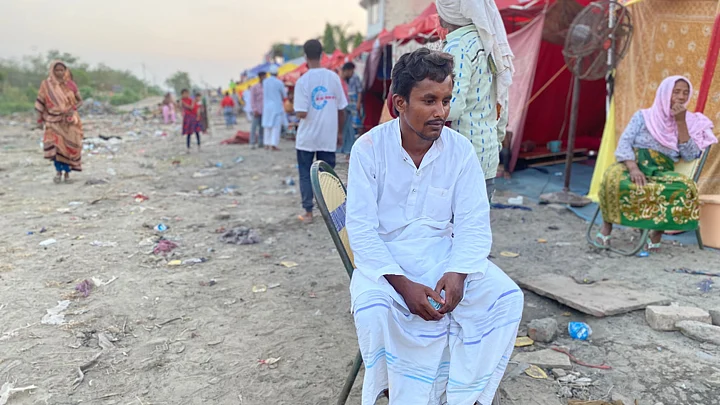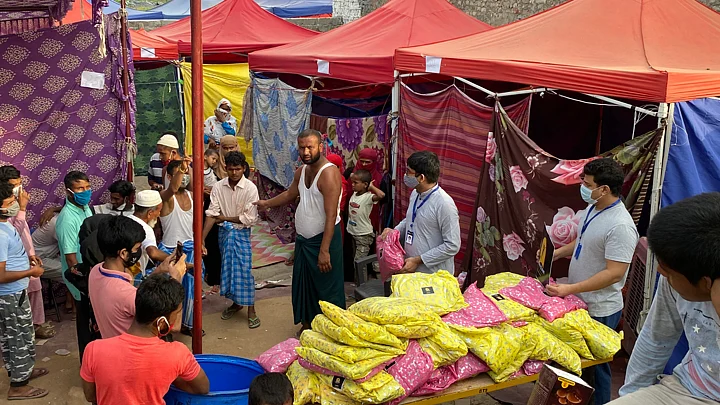Kanchan Kunj in Madanpur Khadar, Southeast Delhi, was a temporary home of makeshift shelters for 53 Rohingya families. On Saturday, 12 June, it burnt down to the ground, again.
This was the third fire of 2021, and the second time in three years that these refugee families watched their homes burn to the ground. It also happened just a few months after a massive fire tore through the Rohingya refugee camps in Bangladesh, killing 15 people.
Whether accident or arson, these frequent disasters continue to re-traumatise Rohingyas and prevent them from making even the most basic lives for themselves in refuge.
After the first destruction of the camp in April 2018, Ali Johar and Jessica Field predicted another tragedy would occur if basic protections were not secured. Ali, a Rohingya youth activist in Delhi, shares his experiences of watching all this happen again.

On 12 June, I had gone to bed after helping my mother take her daily medicines, as my parents have been facing arthritis, high blood sugar, and stress-related high blood pressure for more than three years now.
Around midnight, my sister rapped on my door, catching me by surprise, stating that our mom had fallen unconscious. My sister and I started crying, as my mother is the embodiment of heaven for me in this world.
I soon realised that she had fainted after receiving news that there was a devastating fire burning down the Madanpur Khadar settlement, once again.
'Until When Will Our Families Have to Keep Facing These Horrors?'
This is the same camp where I used to live with my parents. It is still home to many family members, who have struggled to afford to move to a safer place.
As soon as I heard news of the blaze, I texted a couple of my friends and rushed to the camp, arriving within an hour to see how we could help. The fire had already been raging for over an hour. The fire brigade arrived a little before me, but by then the settlement was already consumed by flames.
People were desperately running for their lives, crying and searching for their loved ones. It was as if hell was raining fire upon the Earth.

The devastating fire and emergency service response on 12 June.
(Photo Courtesy: R4R, Rohingya Human Rights Initiative)
Around 3:30 am the fire was brought under control, but there was nothing left. Everyone managed to locate their loved ones, but dozens, including children and elders, sustained injuries. Most of the 53 affected families were unable to save much from the fire, not even crucial personal documents like refugee cards.
This would be a shocking event in its own right, but it is not isolated.
This is the third time the camp has had a fire within this year alone. On the previous two occasions it was brought under control, but on 12 June everything was destroyed.
Just three years earlier, in April 2018, the camp was entirely burnt down and the 50 Rohingya families living there – including my own – lost everything. It nearly killed me, as my door was locked, and I struggled to get out.
In response to the 2018 devastation, local authorities shifted the affected families to a “temporary” settlement close by – but a few months became three years and now, yet again, the community is traumatised and displaced.
I can’t tell you how scary it is like to live through such incidents. Until when will our families and children have to keep facing these horrors?

Remnants of school books, destroyed in the Rohingya camp fire on 12 June.
(Photo Courtesy: Ali Johar, Dr Jessica Field/Accessed by The Quint)
'Politicised Tragedies'
For both devastating fires there is no agreement over what started them. Some people claim they might have been due to a short circuit, others claim they were arson against the refugees.
At the very least, in both cases, their frequency and devastation reveal how difficult it is to be from a refugee community in India, which lacks the basics of dignified and safe living conditions.
In the immediate aftermath of these crises, volunteers gather to show solidarity with the community. Yet this support – as welcome as it is – often lasts only as long as the cameras are rolling.
Worse still, due to the absence of a refugee law in India, and with an increasingly unsympathetic government, such tragedies are easily politicised. Those who don’t want us in India, try to take advantage to force us out however they can.
In 2017, the Indian government ordered the deportation of all Rohingya from India, which is being challenged in the Indian Supreme Court. Since then, so many Rohingyas have faced increased daily scrutiny and harassment.

In March this year, police authorities in Jammu detained more than 170 Rohingyas for “verification” and deportation, with many still suffering in the COVID-19 afflicted detention centre. Just a month after these detentions, more than 12 Rohingya homes in Jammu burnt down in another fire.
'Repeated Harassment'
Back in Delhi, since the 2018 fire, Rohingyas in Madanpur Khadar have also faced repeated harassment from local authorities who want to evict them from this temporary home.
The Madanpur Khadar land near Kalindi Kunj is owned by the Uttar Pradesh Irrigation Department and, almost every week in the run up to the fire, officials had been visiting the camp to try to force families to leave – sometimes threatening them with bulldozers. The Uttar Pradesh authorities are now refusing to resettle Rohingya families on the land.
Alongside these tensions, social media and a portion of the local media have been flooded with anti-Rohingya hatred and misinformation (for example, claiming Rohingyas are a “vote bank” for Delhi parties, when we cannot even vote).
We have tried to guard the camp against arson or attacks by stationing people on watch through the night, but this neighbourly watch cannot catch everything.
This hostile atmosphere creates an additional layer of fear for our people, as the latest fire will wither away from the news and, with it, all the solidarity will wane too.

Rohingya families will then wait in fear of increased state attention and harassment. A 50-year-old Rohingya widow cried out to me during the emergency response, explaining that she had repaired her shanty with all she had – two years’ worth of savings – in anticipation of the approaching monsoon season. After seeing it all destroyed, she doesn’t want to stay under this constant fear anymore.
'No Permanent Solution'
UNHCR (United Nations High Commissioner for Refugees) India has tried to reissue the refugee cards that were burnt in the fire and say they are coordinating with local authorities to find the affected families rental accommodations in the nearby areas. But this requires government permission, and none has yet been issued.
As a result, the 53 families have been forced to “temporarily” reside in 800 square meters of land owned by a charitable foundation, right where the old camp was located until the 2018 fire.
During this burning hot summer and the pandemic situation, Rohingya families are now having to manage within 5×8 feet tents made of cloth, lacking even basic privacy.

This situation is severely impacting Rohingyas' physical and mental health. Delhi Civil Defence has been attending to the urgent humanitarian and security needs of our community. But neither they nor UNHCR or the local authorities have a solution to provide meaningful protection and dignified refuge in the country.
Every time a tragedy unfolds, people talk about it, but no permanent solution is proposed. This time too, I am afraid, we will be left to fend for ourselves, waiting for another tragedy to happen. After watching her home burn down twice in her lifetime, my 10-year-old niece is already asking me, “Where will we go now?”
(Ali Johar is a Rohingya youth leader in New Delhi. Ali has founded the Rohingya Literacy Program and focuses on education opportunities for Rohingya children in India. Dr Jessica Field is a Lecturer in UCL IRDR and a Co-Investigator on IRDR’s British Academy Funded Project ‘Rohingya Journeys of Violence and Resilience in Bangladesh and its Neighbours’. This is an opinion piece and the views expressed are the author’s own. The Quint neither endorses nor is responsible for them.)
(At The Quint, we are answerable only to our audience. Play an active role in shaping our journalism by becoming a member. Because the truth is worth it.)
